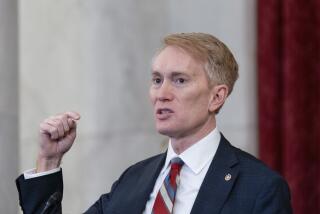Aides to Bush Feared Collapse of Budget Talks : Deficit: Darman and Brady believed that a breakthrough was necessary. Democrats helped draft President’s statement on taxes.
WASHINGTON — For White House Budget Director Richard G. Darman, the deficit negotiations with Congress were nearing “the proverbial midnight hour.”
Congress was scheduled to leave town Friday for more than a week, and Darman and Treasury Secretary Nicholas F. Brady were convinced that some sort of breakthrough was necessary before then to prevent the stalled budget talks from collapsing. So the White House finally delivered what Democrats have long been waiting to hear: President Bush explicitly abandoned his “no new taxes” pledge.
And in the end, it came down to two words.
Bush’s new, carefully stated position emerged at a hastily convened session with three Democratic congressional leaders and two Republicans. Over breakfast in the White House family dining room, Bush suggested drafting a written statement designed to get the negotiations moving again.
Beginning at 7 a.m. and originally scheduled to last one hour, the breakfast continued for a full two hours as “they sat there and wrote the statement together,” a White House official said.
The first draft of the statement, prepared by Darman, said only that “it is clear” that the federal deficit needs to be brought under control through, among other steps, “tax revenue increases,” according to a congressional official who was briefed about the meeting by participants.
But the three Democrats present--House Speaker Thomas S. Foley of Washington, Senate Majority Leader George J. Mitchell of Maine and House Majority Leader Richard A. Gephardt of Missouri--demanded that Bush assume personal responsibility. They insisted that he declare “it is clear to me. . . . “
Ultimately, Bush acceded.
What lay behind Bush’s decision was a series of meetings starting last Thursday in which Democratic lawmakers indicated that they were not prepared to accept Bush’s latest budget proposal as the basis for serious deficit negotiations.
Some Democrats, such as Rep. Leon E. Panetta (D-Carmel Valley), the House Budget Committee chairman, argued that the $51.7-billion deficit-reduction plan offered by Darman last Wednesday could serve as a “starting point” for negotiations.
But Senate Democrats, led by Mitchell and Senate Budget Committee Chairman Jim Sasser of Tennessee, contended that the proposal contained only warmed-over changes from Bush’s original budget. They refused to go forward, for fear that the White House sought to trap them into initiating tax increases.
Mitchell, at a Democratic lunch last Thursday, accused the White House of acting in bad faith. Pulling a card from his jacket, Mitchell read from Bush’s State of the Union address earlier this year: “That budget brings federal spending under control, it meets the Gramm-Rudman target, brings the deficit down further and balances the budget by 1993--with no new taxes.”
“One sentence, five assertions, each of them wholly incorrect,” Mitchell said, according to participants.
Alarmed by such talk, White House officials feared that Democratic lawmakers would walk away from the budget talks and blame Bush for their collapse. That could have potentially devastating consequences for the White House.
Under the Gramm-Rudman deficit-reduction law, failure to achieve a budget accord would automatically trigger huge spending cuts in October from virtually all government programs. The cuts could decimate such vital government services as air traffic control, the FBI and the cleanup of hazardous waste dumps. The result could be chaos, and Bush might appear to be responsible.
“We felt it was necessary to get things moving again,” a senior White House official said.
At the breakfast, an Administration official said: “Democrats were afraid this was going to get political. They said, ‘We want some leadership from you on some specifics, a show of good faith.’ . . . They were afraid they’d get hung out to dry.”
In response, the aide said: “Bush, in effect, said, ‘OK, I’m willing to take the lead and do something public, if you’ll back it up. I’ll cross the 50-yard line.’ ”
But even with Bush’s new stance, there is still a long way to go before wary Democrats and Republicans can reach an agreement.
“This is by no means the end of the road,” Panetta said. “Basically, all we’ve done is gotten over a small hill.”
Pushing hardest for Bush to take a new position, aides said, were Darman and Brady, with White House Chief of Staff John H. Sununu dragged along in their wake. “Sununu was grim,” commented one official, who said that the chief of staff “looked like he got kicked in the face” as Bush told congressional leaders of his decision to back away from his no-new-taxes pledge.
But aides close to Sununu, a former governor of New Hampshire and the architect of Bush’s original anti-tax campaign position in that crucial primary state, insisted that there was no split among top officials. “Sununu is working with Darman,” one official said. “They have been together on it since Day 1. . . . He didn’t do anything behind the governor’s back. No way.”
In a briefing for reporters last week, Darman laid out his strategy for getting the negotiations moving. He focused on the importance of putting together a package by mid-August, when Congress must approve an increase in the ceiling on the national debt.
“It’s not unlike a labor negotiation (in which) people frequently hold out until the proverbial midnight hour,” Darman said. “We have set a somewhat artificial version of the midnight hour. . . . It’s helpful to negotiations because it’s kind of a forcing mechanism, although it’s a rather crude one.”
Staff writers Douglas Jehl and William J. Eaton contributed to this story.
More to Read
Get the L.A. Times Politics newsletter
Deeply reported insights into legislation, politics and policy from Sacramento, Washington and beyond. In your inbox three times per week.
You may occasionally receive promotional content from the Los Angeles Times.










